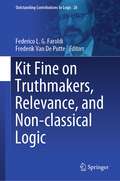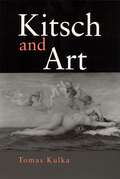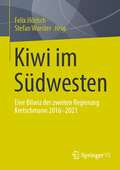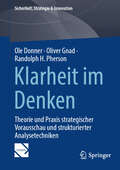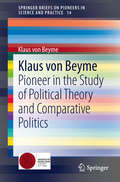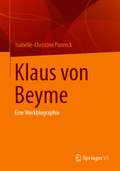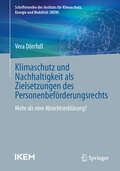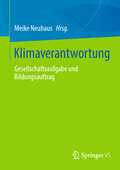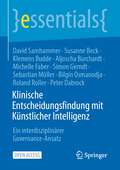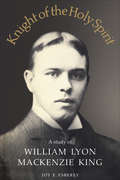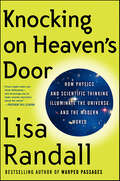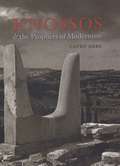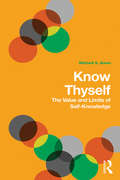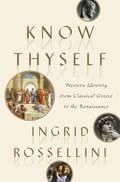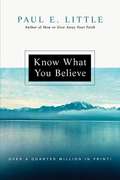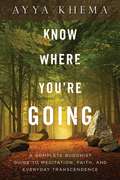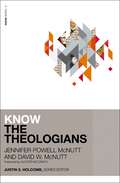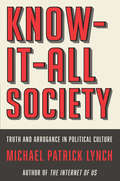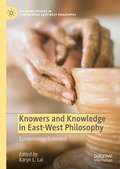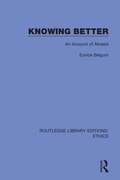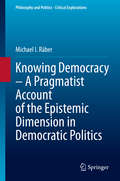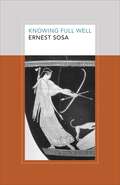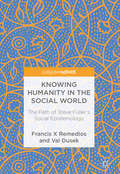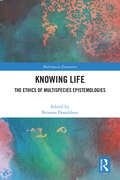- Table View
- List View
Kit Fine on Truthmakers, Relevance, and Non-classical Logic (Outstanding Contributions to Logic #26)
by Federico L. G. Faroldi Frederik Van De PutteThis book explores some of Kit Fine's outstanding contributions to logic, philosophy of language, philosophy of mathematics, and metaphysics, among others.Contributing authors address in-depth issues about truthmaker semantics, counterfactual conditionals, grounding, vagueness, non-classical consequence relations, and arbitrary objects, offering critical reflections and novel research contributions.Each chapter is accompanied by an extensive commentary, in which Kit Fine offers detailed responses to the ideas and themes raised by the contributors. The book includes a brief autobiography and exhaustive list of his publications to this date. This book is of interest to logicians of all stripes and to analytic philosophers more generally.
Kitsch and Art
by Thomas KulkaWhat is kitsch? What is behind its appeal? More important, what is wrong with kitsch? Though central to our modern and postmodern culture, kitsch has not been seriously and comprehensively analyzed; its aesthetic worthlessness has been generally assumed but seldom explained. Kitsch and Art seeks to give this phenomenon its due by exploring the basis of artistic evaluation and aesthetic value judgments. Tomas Kulka examines kitsch in the visual arts, literature, music, and architecture. To distinguish kitsch from art, Kulka proposes that kitsch depicts instantly identifiable, emotionally charged objects or themes, but that it does not substantially enrich our associations relating to the depicted objects or themes. He then addresses the deceptive nature of kitsch by examining the makeup of its artistic and aesthetic worthlessness. Ultimately Kulka argues that the mass appeal of kitsch cannot be regarded as aesthetic appeal, but that its analysis can illuminate the nature of art appreciation.
Kitsch and Art (G - Reference, Information and Interdisciplinary Subjects)
by Thomas KulkaWhat is kitsch? What is behind its appeal? More important, what is wrong with kitsch? Though central to our modern and postmodern culture, kitsch has not been seriously and comprehensively analyzed; its aesthetic worthlessness has been generally assumed but seldom explained. Kitsch and Art seeks to give this phenomenon its due by exploring the basis of artistic evaluation and aesthetic value judgments. Tomas Kulka examines kitsch in the visual arts, literature, music, and architecture. To distinguish kitsch from art, Kulka proposes that kitsch depicts instantly identifiable, emotionally charged objects or themes, but that it does not substantially enrich our associations relating to the depicted objects or themes. He then addresses the deceptive nature of kitsch by examining the makeup of its artistic and aesthetic worthlessness. Ultimately Kulka argues that the mass appeal of kitsch cannot be regarded as aesthetic appeal, but that its analysis can illuminate the nature of art appreciation.
Kiwi im Südwesten: Eine Bilanz der zweiten Regierung Kretschmann 2016-2021
by Felix Hörisch Stefan WursterNach der ersten grün-roten Landesregierung in einem deutschen Bundesland von 2011 bis 2016 in Baden-Württemberg führte Winfried Kretschmann von 2016 bis 2021 zum zweiten Mal eine grün-geführte Landesregierung an – eine lagerübergreifend grün-schwarze Kiwi-Koalition. Auch diese Regierungskonstellation ist bislang in der deutschen Geschichte einmalig. Der Sammelband analysiert, wie sich dieser Regierungswechsel von Grün-Rot zur selbst ernannten grün-schwarzen Komplementärkoalition in den verschiedenen Politikfeldern auf die durchgesetzten Policies ausgewirkt hat. Neben dem expliziten Vergleich der durchgeführten Reformen in den beiden Legislaturperioden beleuchten einzelne Kapitel des Sammelbands beispielsweise auch die Koalitionsbildungsprozesse, die Bürgerbeteiligung und den Einfluss organisierter Interessen unter der zweiten Landesregierung Kretschmann sowie die Verschiebungen im Parteiensystem in Baden-Württemberg.
Klarheit im Denken: Theorie und Praxis strategischer Vorausschau und strukturierter Analysetechniken (Sicherheit, Strategie & Innovation)
by Randolph H. Pherson Oliver Gnad Ole DonnerDieses Buch versetzt Analystinnen und Analysten in Regierung, Privatwirtschaft und Think Tanks in die Lage, globale Risiken und Chancen systematisch zu bewerten, informierte Entscheidungen zu treffen und Unvorhergesehenes zu antizipieren. Die Autoren beleuchten die Grundlagen intuitiven und analytischen Denkens und zeigen auf, wie strukturierte Analysetechniken die Auswirkungen kognitiver Verzerrungen, falsch angewandter Heuristiken und intuitiver Fallen abmildern können. Drei Fallstudien veranschaulichen die Anwendung von über 30 Strukturierten Analyse-Techniken (SAT) in Schritt-für-Schritt-Anleitungen.
Klaus von Beyme
by Klaus BeymeKlaus von Beyme, a highly distinguished German political scientist, has been recognised as a "Pioneer in the Study of Political Theory and Comparative Politics". When he received the highly esteemed Mattei Dogan Award during the XXII World Congress of Political Science in Madrid on 12 July 2012, in his laudatio Rainer Eisfeld portrayed Klaus v. Beyme as a "Global Scholar and Public Intellectual". On the occasion of Klaus v. Beyme's 80th birthday this book offers a selection of his major previously published and new texts focusing on "Empirical Political Theory", "The Evolution of Comparative Politics, Revival of Normative Political Theory in Empirical Research", "Theodor W. Adorno - Political Theory as Theory of Aesthetics", "Historical Forerunners of Policy Studies", "Political Institutions - Old and New", "Representative Democracy and the Populist Temptation", "Political Advisors to Politicians", and on "The Concept of Political Class: A New Dimension of Research on Elites?".
Klaus von Beyme: Eine Werkbiographie
by Isabelle-Christine PanreckKlaus von Beyme forschte und lehrte im Zeitalter der Konfrontationen und Umbrüche: Der Kalte Krieg, die Studentenrevolte 1968/69, die Spaltung des politikwissenschaftlichen Fachverbandes 1983 und der Systemwechsel 1989/90 hinterließen ihre Spuren in den Schriften des international bekannten Heidelbergers. Die Werkbiographie durchdringt das umfangreiche Werk von Beymes, offenbart ideengeschichtliche, zeithistorische und biographische Wurzeln, zeitgenössischen Widerhall in politischen und fachlichen Kontroversen sowie langfristige Prägungen der deutschen Politikwissenschaft.
Klimaschutz und Nachhaltigkeit als Zielsetzungen des Personenbeförderungsrechts: Mehr als eine Absichtserklärung? (Schriftenreihe des Instituts für Klimaschutz, Energie und Mobilität)
by Vera DörrfußDurch das Gesetz zur Modernisierung des Personenbeförderungsrechts vom 16.04.2021 wurde § 1a PBefG in das PBefG neu eingefügt. Damit hat das PBefG neben der gefahrenabwehrrechtlichen Komponente mit Klimaschutz und Nachhaltigkeit eine Weitere hinzugewonnen. Die Norm ist trotz ihres mittlerweile mehr als dreijährigen Bestehens wissenschaftlich noch weitestgehend unerforscht und auch in der Praxis nicht, beziehungsweise kaum bekannt. Dabei stellen sich in ihrem Zusammenhang viele Fragen. So bleibt bei der bloßen Lektüre unklar, welchen Inhalt der abstrakt gehaltene § 1a PBefG haben soll. Es ergibt sich weder, was unter den Klimaschutz- und Nachhaltigkeitszielen zu verstehen ist, noch welche Reichweite ihrer Berücksichtigung zukommen soll. Unklar bleibt auch, ob der Gesetzgeber eine wirkliche Veränderung bei der Anwendung des PBefG und damit positive Auswirkungen auf Klima und Nachhaltigkeit herbeiführen möchte oder es sich vielmehr um sog. „Greenwashing“ handelt. Diese und noch viele weitere Fragen, nimmt die Arbeit zum Anlass, um die neue Maßgabe des PBefG, bei Anwendung des Gesetzes die Ziele des Klimaschutzes und der Nachhaltigkeit zu berücksichtigen, genauer zu untersuchen.
Klimaverantwortung: Gesellschaftsaufgabe und Bildungsauftrag
by Meike NeuhausDer Klimawandel ist eine der größten – wenn nicht sogar die größte – Herausforderung unserer Zeit. Bereits heute sind deutliche Auswirkungen auf Ökosysteme, Wirtschaft und soziokulturelle Strukturen spürbar, und es ist zu erwarten, dass diese in Zukunft weiter zunehmen werden. Dass wir Menschen maßgeblich zu diesem Problem beigetragen haben, ist inzwischen überwiegender Konsens. Auch sind sich die meisten Menschen darüber bewusst, dass Maßnahmen ergriffen werden müssen, um dem fortschreitenden Klimawandel entgegenzuwirken. Doch welche konkreten Schritte sind erforderlich? Und wer trägt dafür die Verantwortung? Diesen und anderen Fragen widmen sich die interdisziplinären Beiträge in diesem Buch. Die Diskussion wird ergänzt durch praxisnahe Unterrichtsbeispiele sowie Vorschläge für die Implementierung einer Bildung für nachhaltige Entwicklung (BNE) in der Lehrkräfteausbildung.
Klinische Entscheidungsfindung mit Künstlicher Intelligenz: Ein interdisziplinärer Governance-Ansatz (essentials)
by Susanne Beck Sebastian Möller Peter Dabrock David Samhammer Klemens Budde Aljoscha Burchardt Michelle Faber Simon Gerndt Bilgin Osmanodja Roland RollerDieses Open-Access-essential schafft Orientierung, wenn Künstliche Intelligenz im klinischen Alltag eingesetzt wird. Die Herausforderungen werden anhand zweier Beispiele aus dem Bereich der Nephrologie erläutert, die ethisch und rechtlich reflektiert werden. Ein umfangreicher Empfehlungsteil schließt diesen durchweg interdisziplinär erarbeiteten Band ab.
Knight of the Holy Spirit: A study of William Lyon Mackenzie King
by Joy EsbereyThis study of the personality of William Lyon Mackenzie King challenges the view that he led 'a double life. ' Through a blending of psycho-biography and political analysis, Joy Esberey shows how King 's personality traits influenced his political behaviour, and how his personal and public life were an integrated whole, neither contradictory nor unrelated. She explores the various traumas of his early family life, resulting in difficulties with autonomy and adequate occupational and sexual roles. She also discusses the dimensions of neurotic trends, including problems associated with his mother 's death, the significance of his religious beliefs and need for spiritualism, the cult of money, and obsessive-compulsive defence mechanisms. King was greatly concerned with the Tennysonian ideal of knightly conduct -- pure and heroic social leadership. This trait is defined in terms of relationships with women and with such men as Lord Tweedsmuir, Loring Christie, and Vincent Massey. His role as policy maker is considered in light of the assertion that consensus rather than compromise characterized his behaviour. This hypothesis is explored through a study of tariff policy and relations with Britain, and through the model of King as peacemaker and his visit to Hitler.Throughout the book, the author makes extensive use of King 's letters and diary, illuminating his personality and showing how, despite his quirks and oddities, he managed to keep himself in balance. This fresh view of King concludes with a brief description of consistencies and repetitions in his personal and political conduct in his declining years. Short Description - This study of the personality of William Lyon Mackenzie King challenges the view that he led 'a double life. ' Through a blending of psycho-biography and political analysis, Joy Esberey shows how King 's personality traits influenced his political behaviour, and how his personal and public life were an integrated whole, neither contradictory nor unrelated.
Knocking on Heaven's Door: How Physics and Scientific Thinking Illuminate the Universe and the Modern World
by Lisa Randall“Science has a battle for hearts and minds on its hands….How good it feels to have Lisa Randall’s unusual blend of top flight science, clarity, and charm on our side.”—Richard Dawkins“Dazzling ideas….Read this book today to understand the science of tomorrow.”—Steven PinkerThe bestselling author of Warped Passages, one of Time magazine’s “100 Most Influential People in the World,” and one of Esquire’s “75 Most Influential People of the 21st Century,” Lisa Randall gives us an exhilarating overview of the latest ideas in physics and offers a rousing defense of the role of science in our lives. Featuring fascinating insights into our scientific future born from the author’s provocative conversations with Nate Silver, David Chang, and Scott Derrickson, Knocking on Heaven’s Door is eminently readable, one of the most important popular science books of this or any year. It is a necessary volume for all who admire the work of Stephen Hawking, Michio Kaku, Brian Greene, Simon Singh, and Carl Sagan; for anyone curious about the workings and aims of the Large Hadron Collider, the biggest and most expensive machine ever built by mankind; for those who firmly believe in the importance of science and rational thought; and for anyone interested in how the Universe began…and how it might ultimately end.
Knossos and the Prophets of Modernism
by Cathy GereIn the spring of 1900, British archaeologist Arthur Evans began to excavate the palace of Knossos on Crete, bringing ancient Greek legends to life just as a new century dawned amid far-reaching questions about human history, art, and culture. Over the next three decades, Evans engaged in an unprecedented reconstruction project, creating a complex of concrete buildings on the site that owed at least as much to modernist architecture as they did to Bronze Age remains. In the process, he fired the imaginations of a whole generation of intellectuals and artists, whose work would drive movements as disparate as fascism and pacifism, feminism and psychoanalysis. With Knossos and the Prophets of Modernism, Cathy Gere relates the fascinating story of Evans's excavation and its long-term effects on Western culture. Gere shows how Evans's often-fanciful account of ancient Minoan society captivated a generation riven by serious doubts about the fundamental values of European civilization. After the First World War left the Enlightenment dream in tatters, the lost paradise that Evans offered in the concrete labyrinth--pacifist and matriarchal, pagan and cosmic--seemed to offer a new way forward for writers, artists, and thinkers such as Freud, James Joyce, Georgio de Chirico, Robert Graves, Hilda Doolittle, all of whom emerge as forceful characters in Gere's account. Assembling a brilliant, talented, and eccentric cast at a moment of tremendous intellectual vitality and wrenching change, Cathy Gere paints an unforgettable portrait of the age of concrete and the birth of modernism.
Know Thyself: The Value and Limits of Self-Knowledge
by Mitchell S. GreenKnow Thyself: The Value and Limits of Self-Knowledge takes the reader on tour of the nature, value, and limits of self-knowledge. Mitchell S. Green calls on classical sources like Plato and Descartes, 20th-century thinkers like Freud, recent developments in neuroscience and experimental psychology, and even Buddhist philosophy to explore topics at the heart of who we are. The result is an unvarnished look at both the achievements and drawbacks of the many attempts to better know one’s own self. Key topics in this volume include: Knowledge – what it means to know, the link between wisdom and knowledge, and the value of living an "examined life" Personal identity – questions of dualism (the idea that our mind is not only our brain), bodily continuity, and personhood The unconscious — including the kind posited by psychoanalysis as well as the form proposed by recent research on the so-called adaptive unconscious Free will – if we have it, and the recent arguments from neuroscience challenging it Self-misleading – the ways we willfully deceive ourselves, and how this relates to empathy, peer disagreement, implicit bias, and intellectual humility Experimental psychology – considerations on the automaticity of emotion and other cognitive processes, and how they shape us This book is designed to be used in conjunction with the free ‘Know Thyself’ MOOC (massive open online course) created through collaboration of the University of Connecticut's Project on Humility and Conviction in Public Life, and the University of Edinburgh’s Eidyn research centre, and hosted on the Coursera platform (https://www.coursera.org/learn/know-thyself). The book is also suitable as a text for interdisciplinary courses in the philosophy of mind or self-knowledge, and is highly recommended for anyone looking for a short overview of this fascinating topic.
Know Thyself: Western Identity from Classical Greece to the Renaissance
by Ingrid RosselliniA lively and timely introduction to the roots of self-understanding--who we are and how we should act--in the cultures of ancient Greece, the Roman Empire, and Middle Ages and the Renaissance "Know thyself"--this fundamental imperative appeared for the first time in ancient Greece, specifically in Delphi, the temple of the god Apollo, who represented the enlightened power of reason. For the Greeks, self-knowledge and identity were the basics of their civilization and their sources were to be found in where one was born and into which social group. These determined who you were and what your duties were. In this book the independent scholar Ingrid Rossellini surveys the major ideas that, from Greek and Roman antiquity through the Christian medieval era up to the dawn of modernity in the Renaissance, have guided the Western project of self-knowledge. Addressing the curious lay reader with an interdisciplinary approach that includes numerous references to the visual arts, Know Thyself will reintroduce readers to the most profound and enduring ways our civilization has framed the issues of self and society, in the process helping us rediscover the very building blocks of our personality.
Know What You Believe (Fifth Edition)
by Paul E. Little Marie LittleWhat does Christianity have to do with anything? What does the Christian faith teach about God, Jesus and the Holy Spirit? What do I need to know about angels, Satan and demons? What place should the Bible or a church have in my life? With these and other core questions, bestselling author Paul E. Little leads you into a greater appreciation of a God who has done great things to bring you into a relationship with him through Jesus Christ. Introduction by James F. Nyquist
Know Where You're Going
by Ayya Ayya KhemaExperience a complete meditation course with one of the West's most renowned Buddhist teachers.Know Where You're Going provides a full course of instruction in Buddhist meditation and reflection, and contains a wealth of exercises and advice to help the reader grow. As we put these teachings into practice over time, we learn to see things as they really are and discover transcendence right here in our everyday lives. Ayya Khema shows us how to live a wholehearted spiritual life, even amid our day to day concerns and responsibilities. Her teachings unfold simply, free of jargon, and are ideal for the contemporary world. Grounding the practice of more advanced meditations in a deeply cultivated sense of mindfulness, love, and altruism, Khema shows us, step by step, how to access to liberation and freedom.
Know the Theologians (KNOW Series)
by Jennifer Powell McNutt David McNuttFinalist for the 2025 Christianity Today Book Award in Popular TheologyKnow the Theologians is an introduction to the most important thinkers throughout church history and a demonstration of their ongoing relevance for believers today.The Bible describes the church as a kind of family. Those who believe in Christ are sisters and brothers in the faith, whether they live at the same time or are separated by centuries. For that reason, believers today need to know our family members who have come before and shaped our beliefs and practices now. In Know the Theologians, professors and authors Jennifer Powell McNutt and David W. McNutt introduce the most significant thinkers in the church's history.McNutt and McNutt survey over a dozen primary figures, including Eastern Orthodox, Roman Catholic, and Protestant theologians, who represent the breadth and depth of the church's theology. The book explores how they fit into their own time period and also draws attention to the theological voices of women throughout the church's history. Every chapter includes short sidebars on figures contemporary to the main theologians, bringing in additional important voices.This book has everything you need for a full personal or group study experience.As part of the KNOW series, Know the Theologians is designed for either personal study or classroom use, and it will also be an accessible resource for small groups and adult education in churches. Chapters end with reflection questions and recommended reading for further study.An individual access code to stream all video sessions online. (You don&’t need to buy a DVD!)Sessions:PART 1: EARLY CHRISTIAN THEOLOGIANS1. Irenaeus of Lyons2. Athanasius of Alexandria3. The Cappadocian Four4. Augustine of HippoPART 2: MEDIEVAL THEOLOGIANS5. John of Damascus6. Anselm of Canterbury7. Julian of Norwich8. Thomas AquinasPART 3: REFORMATION THEOLOGIANS9. Martin Luther10. John Calvin11. Menno Simons12. Teresa of AvilaPART 4: MODERN THEOLOGIANS13. The Wesley Brothers14. Friedrich Schleiermacher15. Karl Barth16. Gustavo GutiérrezStreaming video access code included.?Access code subject to expiration after 4/2/2029. Code may be redeemed only by the recipient of this package. Code may not be transferred or sold separately from this package. Internet connection required. Void where prohibited, taxed, or restricted by law. Additional offer details inside.
Know-It-All Society: How Dogmatism And Arrogance Are Defining Culture And What To Do About It
by Michael P. LynchThe “philosopher of truth” (Jill Lepore, The New Yorker) returns with a clear-eyed and timely critique of our culture’s narcissistic obsession with thinking that “we” know and “they” don’t. Taking stock of our fragmented political landscape, Michael Patrick Lynch delivers a trenchant philosophical take on digital culture and its tendency to make us into dogmatic know-it-alls. The internet—where most shared news stories are not even read by the person posting them—has contributed to the rampant spread of “intellectual arrogance.” In this culture, we have come to think that we have nothing to learn from one another; we are rewarded for emotional outrage over reflective thought; and we glorify a defensive rejection of those different from us. Interweaving the works of classic philosophers such as Hannah Arendt and Bertrand Russell and imposing them on a cybernetic future they could not have possibly even imagined, Lynch delves deeply into three core ideas that explain how we’ve gotten to the way we are: • our natural tendency to be overconfident in our knowledge; • the tribal politics that feed off our tendency; • and the way the outrage factory of social media spreads those politics of arrogance and blind conviction. In addition to identifying an ascendant “know-it-all-ism” in our culture, Lynch offers practical solutions for how we might start reversing this dangerous trend—from rejecting the banality of emoticons that rarely reveal insight to embracing the tenets of Socrates, who exemplified the humility of admitting how little we often know about the world, to the importance of dialogue if we want to know more. With bracing and deeply original analysis, Lynch holds a mirror up to American culture to reveal that the sources of our fragmentation start with our attitudes toward truth. Ultimately, Know-It-All Society makes a powerful new argument for the indispensable value of truth and humility in democracy.
Knowers and Knowledge in East-West Philosophy: Epistemology Extended (Palgrave Studies in Comparative East-West Philosophy)
by Karyn L. LaiThis volume offers arguments from eastern and western philosophical traditions to enrich and diversify our present conceptions of knowledge. The contributors extend contemporary Western epistemology in novel directions, through investigating and questioning entrenched conceptions of knowledge. The cross-tradition engagement with the neurosciences, psychology, and anthropological studies is an important feature of the volume’s methodological approach that helps broaden our epistemological horizons. It presents a collection of perspectives on epistemic agency by engaging philosophical traditions east and west, including Japanese, Buddhist, Confucian, Daoist, and Anglo-analytic.
Knowing Better: An Account of Akrasia
by Eunice BelgumOriginally published in 1990, this book deals with the question of akrasia, weakness of will, or knowing better but doing worse. Versions of this principle are presupposed by Socrates and Plato, articulated as the ‘practical syllogism’ in Aristotle and play a central role in modern decision theory. The book considers the psychological explanation for this and different responses to the problem. The work is of interest not only as a piece of classical scholarship, action theory and moral psychology, but as a piece of meta-philosophy, and the philosophy about the methodology of philosophical disputes. It has enduring relevance as the problem of akrasia continues to be the object of much philosophical argument.
Knowing Democracy – A Pragmatist Account of the Epistemic Dimension in Democratic Politics (Philosophy and Politics - Critical Explorations #14)
by Michael I. RäberHow can we justify democracy’s trust in the political judgments of ordinary people? In Knowing Democracy, Michael Räber situates this question between two dominant alternative paradigms of thinking about the reflective qualities of democratic life: on the one hand, recent epistemic theories of democracy, which are based on the assumption that political participation promotes truth, and, on the other hand, theories of political judgment that are indebted to Hannah Arendt’s aesthetic conception of political judgment. By foregrounding the concept of political judgment in democracies, the book shows that a democratic theory of political judgments based on John Dewey’s pragmatism can navigate the shortcomings of both these paradigms. While epistemic theories are overly and narrowly rationalistic and Arendtian theories are overly aesthetic, the neo-Deweyan conception of political judgment proposed in this book suggests a third path that combines the rationalist and the aesthetic elements of political conduct in a way that goes beyond a merely epistemic or a merely aesthetic conception of political judgment in democracy. The justification for democracy’s trust in ordinary people’s political judgments, Räber argues, resides in an egalitarian conception of democratic inquiry that blends the epistemic and the aesthetic aspects of the making of political judgments. By offering a rigorous scholarly analysis of the epistemic and aesthetic foundations of democracy from a pragmatist perspective, Knowing Democracy contributes to the current debates in political epistemology and aesthetics and politics, both of which ask about the appropriate reflective and experiential circumstances of democratic politics. The book brings together for the first time debates on epistemic democracy, aesthetic judgment and those on pragmatist social epistemology, and establishes an original pragmatist conception of epistemic democracy.
Knowing Full Well (Soochow University Lectures in Philosophy #3)
by Ernest SosaIn this book, Ernest Sosa explains the nature of knowledge through an approach originated by him years ago, known as virtue epistemology. Here he provides the first comprehensive account of his views on epistemic normativity as a form of performance normativity on two levels. On a first level is found the normativity of the apt performance, whose success manifests the performer's competence. On a higher level is found the normativity of the meta-apt performance, which manifests not necessarily first-order skill or competence but rather the reflective good judgment required for proper risk assessment. Sosa develops this bi-level account in multiple ways, by applying it to issues much disputed in recent epistemology: epistemic agency, how knowledge is normatively related to action, the knowledge norm of assertion, and the Meno problem as to how knowledge exceeds merely true belief. A full chapter is devoted to how experience should be understood if it is to figure in the epistemic competence that must be manifest in the truth of any belief apt enough to constitute knowledge. Another takes up the epistemology of testimony from the performance-theoretic perspective. Two other chapters are dedicated to comparisons with ostensibly rival views, such as classical internalist foundationalism, a knowledge-first view, and attributor contextualism. The book concludes with a defense of the epistemic circularity inherent in meta-aptness and thereby in the full aptness of knowing full well.
Knowing Humanity in the Social World
by Val Dusek Francis X RemediosThis book examines Fuller's pioneering vision of social epistemology. It focuses specifically on his work post-2000, which is founded in the changing conception of humanity and project into a 'post-' or 'trans-' human future. Chapters treat especially Fuller's provocative response to the changing boundary conditions of the knower due to anticipated changes in humanity coming from the nanosciences, neuroscience, synthetic biology and computer technology and end on an interview with Fuller himself. While Fuller's turn in this direction has invited at least as much criticism as his earlier work, to him the result is an extended sense of the knower, or 'humanity 2. 0', which Fuller himself identifies with transhumanism. The authors assess Fuller's work on the following issues: Science and Technology Studies (STS), the university and intellectual life, neo-liberal political economy, intelligent design, Cosmism, Gnosticism, agent-oriented epistemology, proactionary vs precautionary principles and Welfare State 2. 0.
Knowing Life: The Ethics of Multispecies Epistemologies (Multispecies Encounters)
by Donaldson, Edited by BrianneKnowing Life examines the limits of dominant knowledge forms that contribute to current practices negatively affecting more-than-human beings, while also exploring alternative approaches to knowing that are capable of reducing harm and maximizing planetary thriving.Specifically, this volume seeks multispecies answers to long-standing questions in Western philosophy: Who or what counts as a knower? What kinds of knowing are valid? Is knowledge a product of mind, body, or something else? Historically, these epistemic questions have been answered in ways that neutralize the knowing and knowledge contribution of and for more-than-human beings, as well as those on the margins of society considered less than “human.” Consequently, these epistemic assumptions often support the destruction of ecological habitats, industrialization of food animals, widespread use of insect and plant toxins, water and air pollution, climate extinctions, ecological militarism, and the perpetual flow of living beings used for entertainment, research, clothing, companionship, and economic resources.In this book, crosscultural and multidisciplinary contributors—including lesser-known global religious-philosophical accounts, philosophies of plant and insect life, race and disability studies, laboratory epistemology, embodied semiotics, and scholar-artists—challenge and expand these classical concepts through diverse modes of embodied engagement on multispecies knowing toward open futures of planetary co-flourishing.
